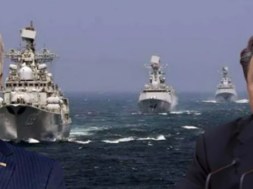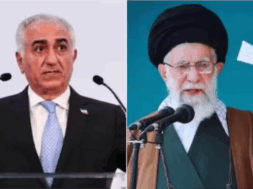
Roving Periscope: 10 Pacific nations reject China’s anti-Quad plan
Virendra Pandit
New Delhi: It’s like Godzilla trapped in the suspension cables of Brooklyn Bridge in New York before its elimination.
Suspecting Beijing’s ulterior motives to pull them into the Dragon’s orbit, at least 10 Pacific island nations have rebuffed China’s push for a wide-ranging regional security pact.
Last week, leaders of the Quadrilateral Security Dialogue (Quad), at their Summit in Tokyo, unveiled a USD 50 billion, five-year infrastructure booster plan—the Indo-Pacific Economic Framework (IPEF) for this region’s nations to keep them away from China’s expansionist and debt-trapping designs. To counter this, Beijing had rushed its Foreign Minister to a dozen countries to lure them with lollypops.
However, having seen the fate of Sri Lanka because of the Chinese debt trap, and other hasty agreements, these cautious countries rejected Beijing’s efforts to hook them as well.
Talks in Fiji between Chinese Foreign Minister Wang Yi and leaders from the small island nations failed to agree. This was a high-profile diplomatic setback for Beijing, the media reported.
China offered to radically ramp up its activities in the South Pacific, directly challenging the influence of the US and its Quad allies (India, Australia, and Japan) in the strategically vital region.
The proposed pact would have seen China train Pacific islands’ police, become involved in cybersecurity, expand political ties, conduct sensitive marine mapping, and gain greater access to natural resources on land and in the water.
As a lollypop, Beijing offered millions of dollars in financial help, the prospect of a potentially lucrative China-Pacific islands free trade agreement, and access to the Dragon’s vast market of 1.4 billion people.
Behind the scenes, however, the Pacific leaders voiced deep concerns about the Chinese offer.
In a letter to fellow Pacific nations’ leaders, David Panuelo, the President of the Federated States of Micronesia, warned that China’s offer was “disingenuous” and would “ensure Chinese influence in government” and “economic control” of key industries.
A more soft-spoken public rebuke came after the talks when leaders said they could not agree to Beijing’s proposed “Common Development Vision” because of a lack of regional consensus.
“As always, we put consensus first,” co-host and Fijian Prime Minister Frank Bainimarama said after the meeting, showing that they would need a broad accord before inking any “new regional agreements”.
Papua New Guinea, Samoa, and the Federated States of Micronesia were among those concerned about the proposals, along with Taiwan-recognising Palau, which was not invited.
“We would rather deal with our own security issues with China,” Papua New Guinea Foreign Minister Soroi Eoe said, showing concern about any region-wide pact.
Chinese officials — working frantically to secure support during Wang’s 10-day diplomatic blitz of the region— admitted their entreaties had fallen short.
“There has been general support from the 10 countries,” the Chinese Ambassador to Fiji, Qian Bo, said in Suva. “But of course, there are some concerns on some specific issues and we have agreed that they will discuss afterward these two documents until they agreed.”
In Suva, Wang made the face-saving announcement that the 10 countries had agreed to memorandums of understanding (MoUs) on China’s “Belt and Road” infrastructure initiative.
The two sides will “continue to have ongoing and in-depth discussions and consultations to shape more consensus on cooperation”, he said, urging those worried by Beijing’s intentions not to be “too anxious and don’t be too nervous”.
The full proposal has not been made public but was leaked to the media ahead of Monday’s meeting.
China said it will release a “position paper” highlighting the proposals to the public in the coming weeks.
The West and its allies in the Indo-Pacific region—India, Australia, Japan, etc.–have bristled against China’s move into the region, with the US State Department warning South Pacific nations to be wary of “shadowy, vague deals with little transparency”.
After the US, Australia also urged nations to spurn China’s attempts to expand its security reach deep into the region. The new Australian foreign minister, Penny Wong, warned of the “consequences” of such deals.
But many in the Pacific region are uneasy at being thrust to the center of a geopolitical tussle essentially between China and the US allies.
Before the meeting, President Xi Jinping, to heap indirect pressure on these smaller nations, sent a message that China would be “a good brother” to the region and that they shared a “common destiny”, according to the Chinese state broadcaster CCTV.














